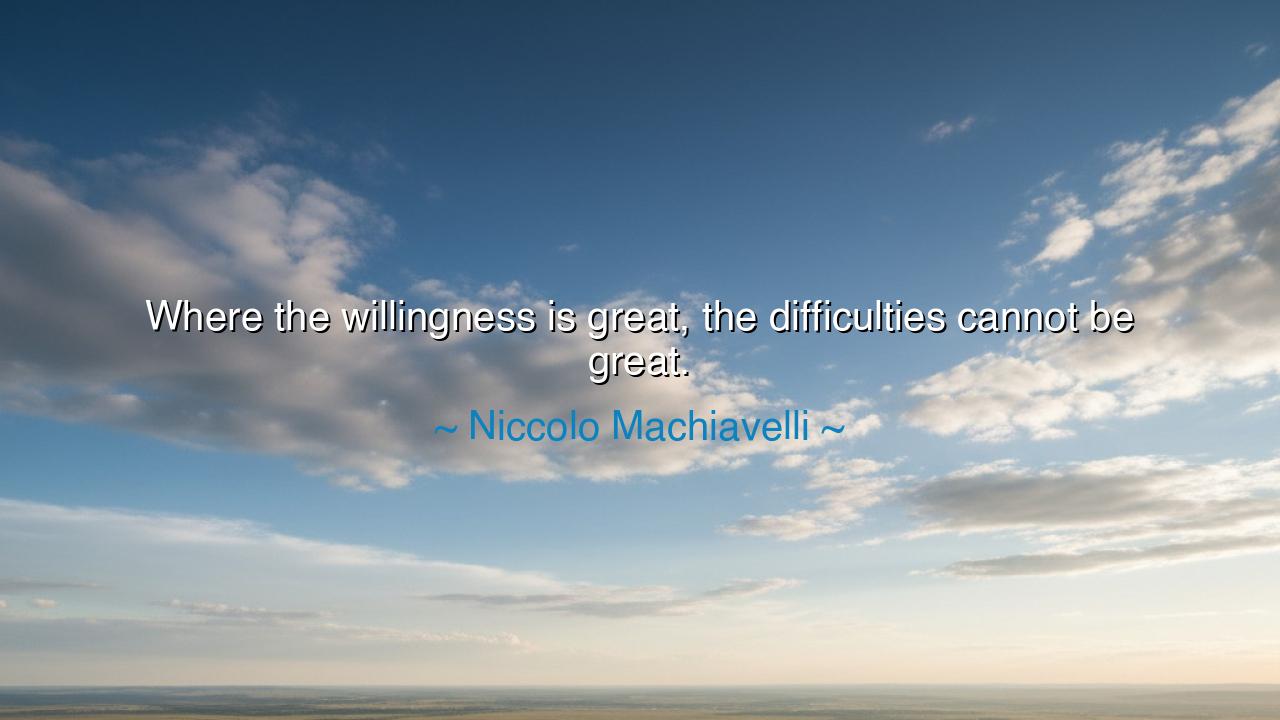
Where the willingness is great, the difficulties cannot be great.






“Where the willingness is great, the difficulties cannot be great.” Thus wrote Niccolò Machiavelli, the Florentine thinker whose pen shaped the art of politics and the understanding of human will. In this brief but immortal sentence, he revealed a truth that belongs not merely to princes and rulers, but to all who strive toward purpose: that the strength of one’s desire can overcome the weight of one’s obstacles. When the heart burns with conviction, no barrier seems insurmountable; when the spirit is faint, even the smallest task becomes an ordeal. Machiavelli, often called a realist of cold reason, here speaks as a poet of determination — declaring that the greatness of the will transforms hardship into possibility.
The origin of this quote lies in his famous work, The Prince, written in 1513 during a time of turmoil in Italy. Banished from political power and under suspicion, Machiavelli observed the shifting tides of fortune and power. Yet from his exile, he wrote words of fire that would echo through centuries. In this line, he offered wisdom to those who would lead: that courage and resolve are worth more than wealth or circumstance. A ruler, he said, must not wait for fortune’s favor but must shape destiny with boldness. To him, great achievements belong not to the lucky, but to the willing — those who do not flinch before challenge, but embrace it as the crucible of greatness.
The meaning of this saying extends far beyond politics. It speaks to the very essence of the human condition. Every life, however humble, faces trials; every path toward purpose is strewn with stones. But those whose willingness is great, whose hearts are set aflame with devotion to their cause, find strength that others cannot imagine. The mountain that seems unscalable to one man becomes a stepping stone to another whose spirit will not yield. For it is not the size of the obstacle that defines the outcome — it is the magnitude of the will that meets it.
Consider the story of Helen Keller, who, though struck blind and deaf as a child, refused to live in the darkness of despair. Guided by her teacher Anne Sullivan, she learned to read, to write, to speak — and to inspire millions. Her life was proof of Machiavelli’s truth: that when willingness is great, the difficulties, however immense, shrink in comparison. What seemed impossible became inevitable, for her resolve was greater than her limitations. Her triumph was not the absence of struggle, but the transformation of struggle into strength.
Machiavelli’s wisdom also carries a deeper moral: that greatness demands both desire and discipline. Willingness is not mere wishing. It is not the fragile enthusiasm that fades when confronted with hardship. It is the iron resolve that bends circumstance to purpose. The man who truly wills does not say, “I hope,” but “I will.” He does not wait for conditions to improve; he creates the conditions by his perseverance. In this way, the impossible becomes possible, not because the world changes, but because the human heart refuses to yield.
This truth, though ancient, remains vital in every age. In our time, many grow weary before the first trial, mistaking ease for success and comfort for happiness. Yet those who live by Machiavelli’s teaching know that difficulty is not the enemy but the measure of worth. The road of the willing is never smooth, yet it leads always upward. To walk it requires courage, patience, and faith — faith that each step forward, however small, draws one nearer to victory.
Therefore, O seeker of wisdom, let this teaching be a light in times of struggle: if your willingness is great, your burden will be light. When you commit wholly to your purpose — with your mind, your hands, and your soul — the world itself seems to yield before you. Do not waste time counting your difficulties; instead, magnify your willingness. The will is the forge of destiny, and every great deed, from the building of cities to the saving of lives, began with one soul who refused to be daunted.
For as Machiavelli teaches, the measure of difficulty is never absolute — it is bound to the size of one’s will. And where the willingness is great, the path, however steep, becomes not a punishment, but a pilgrimage. The one who truly wills walks with purpose and rises with each obstacle, until at last he stands not above his hardships, but strengthened by them — a living testament that the greatest power in man is not fortune, but the unwavering fire of the will.






AAdministratorAdministrator
Welcome, honored guests. Please leave a comment, we will respond soon